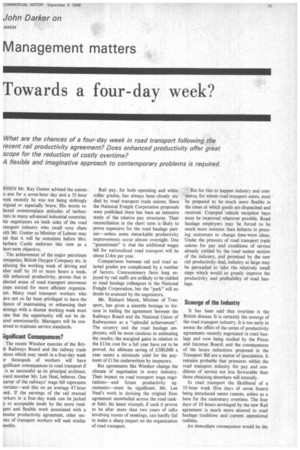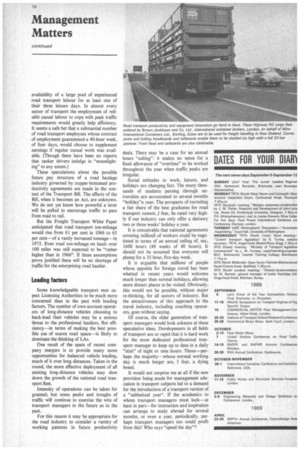Management matters
Page 81

Page 82

If you've noticed an error in this article please click here to report it so we can fix it.
Towards a four-day week?
What are the chances of a four-day week in road transport following the recent rail productivity agreement? Does enhanced productivity offer great scope for the reduction of costly overtime?
A flexible and imaginative approach to contemporary problems is required.
WHEN Mr. Ray Gunter advised the unions o aim for a seven-hour day and a 35-hour week recently he was not being strikingly niginal or especially brave. His words relected commonplace attitudes of tech norats in many advanced industrial countries. lut negotiators on both sides of the road ransport industry who recall cosy chats with Mr. Gunter as Minister of Labour may eel that it will be sometime before Mrs. larbara Castle endorses this view as a hort-term objective.
The achievement of the major petroleum :ompanies, British Oxygen Company etc. in educing the working week of driving and ■ ther staff by 10 or more hours a week, with enhanced productivity, proves that in elected areas of road transport enormous cope existed for more efficient organizaion. Many road transport workers who lave not so far been privileged to have the hance of maintaining or enhancing their amings with a shorter working week must ,ope that the opportunity will not be deiyed unnecessarily. Managers will be conerned to maintain service standards.
iignificant Consequences?
The recent Windsor exercise of the Britdt Railways Board and the railway trade nions which may result in a four-day week N thousands of workers will have ignificant consequences in road transport if is as successful as its principal architect, lcard member Mr. Len Neal, believes. One uarter of the railways' wage bill represents vertime—and this on an average 47-hour teek. If the earnings of the rail manual ?orkers in a four-day week can be jacked p to acceptable levels by the more intelgent and flexible work associated with a enuine productivity agreement, other secons of transport workers will seek similar enefits. Rail pay, for both operating and whitecollar grades, has always been closely studied by road transport trade unions. Since the National Freight Corporation proposals were published there has been an intensive study of the relative pay structures. Their reconciliation in the short term is likely to prove expensive for the road haulage partner—unless some remarkable productivity improvements occur almost overnight. One "guesstimate" is that the additional wages bill for nationalized road transport will be about £14m per year.
Comparisons between rail and road salaried grades are complicated by a number of factors. Concessionary fares long enjoyed by rail staffs are unlikely to be yielded to road haulage colleagues in the National Freight Corporation, but the "perk" will no doubt be assessed by the negotiators.
Mr. Richard Marsh, Minister of Transport, has given a sizeable hostage to fortune in hailing the agreement between the Railways Board and the National Union of Railwaymen as a "splendid achievement". The country and the road haulage employers, will be more cautious in estimating the results; the marginal gains in relation to the £13m cost for a full year have yet to be proved. An ultimate saving of £300,000 a year seems a miniscule yield for the payment of £13m underwritten by taxpayers.
But agreements like Windsor change the climate of negotiation in every industry. Their impact on road transport wage negotiations--and future productivity agreements—must be significant. Mr. Len Neal's work in devising the original Esso agreement snowballed across the road tanker field; his latest triumph, if such it proves to be after more than two years of talks involving scores of meetings, can hardly fail to make a sharp impact on the organization of road transport. But for this to happen industry and commerce, for whom road transport exists, must be prepared to be much more flexible in the times at which goods are dispatched and received. Cramped vehicle reception bays must be improved wherever possible. Road haulage employers may be forced to be much more insistent than hitherto in pressing customers to change time-worn ideas. Under the pressure of road transport trade unions for pay and conditions of service already yielded by the road tanker section of the industry, and promised by the new rail productivity deal, industry at large may be persuaded to take the relatively small steps which would so greatly improve the productivity and profitability of road haulage.
Scourge of the Industry It has been said that overtime is the British disease. It is certainly the scourge of the road transport industry. It is too early to assess the effect of the series of productivity agreements recently negotiated in road haulage and now being studied by the Prices and Incomes Board; and the consequences of the hours reductions proposed in the Transport Bill are a matter of speculation. It remains probable that pressures within the road transport industry for pay and conditions of service not less favourable than those obtaining elsewhere will intensify.
In road transport the likelihood of a 35-hour week (five days of seven hours) being introduced seems remote, unless as a base for the customary overtime. The four days of 10 hours envisaged by the new Rail agreement is much more attuned to road haulage traditions and current operational realities.
An immediate consequence would be the
availability of a large pool of experienced road transport labour for at least one of their three leisure days. In almost every sector of transport the employment of reliable casual labour to cope with peak traffic requirements would greatly help efficiency. It seems a safe bet that a substantial number of road transport employees whose contract of employment guaranteeed a 40-hour week, of four days, would choose to supplement earnings if regular casual work was available. (Though there have been no reports that tanker drivers indulge in "moonlighting" to any extent.)
These speculations about the possible future pay structure of a road haulage industry governed by copper-bottomed productivity agreements are made in the context of the Transport Bill. The effects of the Bill, when it becomes an Act, are unknown. We do not yet know how powerful a lever will be pulled to encourage traffic to pass from road to rail.
But the Freight Transport White Paper anticipated that road transport ton-mileage would rise from 61 per cent in 1966 to 65 per cent—of a vastly increased tonnage—in 1975. Even road ton-mileage on hauls over 100 miles was still expected to be "rather higher than in 1966". If these assumptions prove justified there will be no shortage of traffic for the enterprising road haulier.
Loading factors
Some knowledgeable transport men expect Licensing Authorities to be much more concerned than in the past with loading factors. The number of own-account operators of long-distance vehicles choosing to back-load their vehicles may be a serious threat to the professional hauliers. But efficiency—in terms of making the best possible use of scarce road space—is likely to dominate the thinking of LAs.
One result of the spate of recent company mergers is to provide many more opportunities for balanced vehicle loading, much of it over long distances. Taken in the round, the more effective deployment of all existing long-distance vehicles may slow down the growth of the national road transport fleet.
Intensity of operations can be taken for granted; but some peaks and troughs of traffic will continue to exercise the wits of transport managers in the future as in the past.
For this reason it may be appropriate for the road industry to consider a variety of working patterns in future productivity deals. There may be a case for an annual hours "ceiling": it makes no sense for a fixed allowance of "overtime" to be worked throughout the year when traffic peaks are irregular.
Social attitudes to work, leisure, and holidays are changing fast. The many thousands of students passing through universities are accustomed to several months "holiday"a year. The prospects of recruiting a fair share of the best graduates for road transport cannot, j fear, be rated very highly if our industry can only offer a derisory two or three weeks' holiday a year.
It is conceivable that national agreements covering million A of workers could be negotiated in terms of an annual ceiling of, say, 1600 hours (40 weeks of 40 hours). It should not be assumed that everyone will plump for a 35-hour, five-day week.
It is arguable that millions of people whose appetite for foreign travel has been whetted in recent years would welcome much longer than normal holidays, allowing more distant places to be visited. Obviously, this would not be possible, without major re-thinking, for all sectors of industry. But the attractiveness of this approach to the travel industry, including coaching operators, goes without saying.
Of course, the older generation of transport managers would look askance at these speculative ideas. Developments in all fields of transport are so rapid that it is hard work for the most dedicated professional transport manager to keep up to date in a daily "stint" of 'eight or nine hours. Those—perhaps the majority—whose normal working day is much longer are, I fear, a dying breed.
It would not surprise me at all if the new provision being made for management education in transport subjects led to a demand for the introduction of a transport version of a "sabbatical year". If the academics to whom transport managers must look—at least in part—for instruction and inspiration can arrange to study abroad for several months, or even a year, periodically, perhaps transport managers too could profit from this! Who says "speed the day"?










































































































































